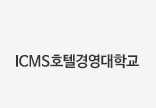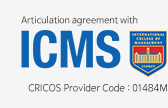| 교육과정 유니센터 ICMS호텔대학교 교육과목 상세안내 |
| |
Service Management & Innovation |
 |
|
|
| |
Accounting Fundamentals |
 |
|
| |
Managing People & Organisations |
 |
|
|
| |
Principles of Marketing |
 |
|
| |
Introduction to Information Systems |
 |
|
|
| |
Business Communication |
 |
|
| |
Business Economics |
 |
|
|
| |
Introduction to Human Resources |
 |
|
| SERVICE MANAGEMENT & INNOVATION |
|
The service economy is growing, currently comprising over 60% of the nation’s GDP and employing 7 out of every 10 workers. In addition, growth in developing countries is rapid, with India and China approaching 50% service employment. This class is concerned with the design and delivery of services: How to design and improve the service offering for sustained excellence, and how to identify and overcome key challenges in the service delivery. We consider a wide range of industries: from traditional services such as restaurants & hotels, to e-commerce, professional services, and services from both the public and private sector. |
| Mid-term Exam |
Final Exam |
Assignment
(Written/Presentation) |
Attendance |
Total |
| 20% |
30% |
40% |
10% |
100% |
|
Regardless of the job titles, most of the workers will have to work in contact with accounting information at some point, which may, most of the time, be a very crucial thing that needs to be considered when making decisions. The main objective of the course Accounting Fundamentals is to help students understand fundamental accounting concepts and principles, as well as to develop the capability to perform the basic accounting functions: the recognition, valuation, measurement and recording of the most common business transactions and the preparation of accounting statement. |
| Quiz |
Final Exam |
Assignment
(Written/Presentation/Role-play) |
Attendance |
Total |
| 20% |
40% |
30% |
10% |
100% |
|
| MANAGING PEOPLE & ORGANIZATIONS |
|
Managing People & Organizations will treat the major challenges in the management of people, primarily in for-profit corporations. It will not teach detailed management techniques and methods; it will focus instead on understanding the long-term issues facing the field. The course will also present a series of current controversies rooted in these economic changes, and explore different perspectives and arguments. The key learning objective is for students to develop informed opinions on these important issues of the day. This course will be comprised of numbers of class discussions and debates. A major skill that will be assessed in the course is to make a convincing argument, through the use of consistent logic and relevant evidence. The class participation will be recorded and applied to the final grade substantially.
|
| Quiz |
Final Exam |
Assignment
(Written/Presentation) |
Class participation |
Total |
| 10% |
50% |
20% |
20% |
100% |
|
Marketing is a dynamic and an exciting field, a key tool in confronting the challenges companies are facing at home and abroad. People often confuse marketing with advertising and sales. In this course you will learn about the “True” meaning and scope of marketing management of which advertising and sales are simply only two facets. You will be introduced to other aspects marketing and learn about the strategic importance of marketing to an enterprise, whether it be a profit oriented business firm or non-profit organization. Most importantly, you will learn that the fundamental asset of a corporation is its customers. Hence, the supreme importance of the “marketing concept” is an attempt to identify and satisfy its customers’ needs and wants. |
| 1 Quiz&Mid-term Exam |
Final Exam |
Assignment
(Written/Presentation/Role-play) |
Attendance |
Total |
| 20% |
30% |
40% |
10% |
100% |
|
| INTRODUCTION TO INFORMATION SYSTEMS |
|
Information Technology (IT) has become vital to the products, services, management, and operation of organizations of every size and in every industry. Those that successfully deploy IT can achieve a significant advantage over their competitors.The ability to use information technology effectively is also a key factor in achieving personal success as a manager.
This course is not primarily about technology. Rather, it addresses several inter-related questions about the use of information technology in rganizations:
+ How can information systems be used by an organisation to achieve an advantage over its competitors?
+ How can you use information technology to do your job better and achieve greater success in your career?
+ How has information technology changed the way organisations work and what further changes are likely in the future? |
| Quiz |
Final Exam |
Assignment
(Written/Presentation) |
Attendance |
Total |
| 10% |
35% |
45% |
10% |
100% |
|
This course highlights the theory and practice of written, oral, and interpersonal communication used in the workplace with emphasis on composing clear, concise and effective business correspondence. Students will discuss various types of communication media and the importance of simple but clear written and oral communication in modern business interactions. Students will have extensive practice writing different types of documents, including professional emails and reports. In addition, the course will introduce to effective planning and delivery strategies for professional oral presentations. |
| Mid-term Exam |
Final Exam |
Assignment
(Written/Presentation/Role-play) |
Attendance |
Total |
| 20% |
30% |
40% |
10% |
100% |
|
This course applies economic theory and methodology to business problems. Topics include demand analysis, determination of cost, pricing and profitability. Marketing and sales forecasting techniques are also introduced briefly.
The objectives of this course are three:
+ Introduce the student to the fundamentals of micro and macro-economic theory and practice as they are applied to business in a managerial context.
+ Provide the student with the basic analytical skills, insights and managerial decision-making tools required
+ Explain the forces that shape the external environment of the firm such as aggregate demand, economic cycles, inflation, interest rates, exchange rates, and the role that demand management policies play in the economy and their impact on the firm’s operations. |
| Mid-term Exam |
Final Exam |
Assignment
(Written/Presentation/Role-play) |
Attendance |
Total |
| 20% |
40% |
30% |
10% |
100% |
|
| INTRODUCTION TO HUMAN RESOURCES |
|
This course is designed to introduce students to the fundamentals of human resource management, including the business case for human resource management and an overview of the skills necessary to effectively manage human resources. The course will first begin with an introduction of “why human resource management matters in today’s business world”. The course will then discuss how employee performance and legal compliance serve as intermediary processes that connect human resource practices to organizational performance and effectiveness. Then course will finally discuss the implementation of staffing and talent management practices. |
| Mid-term Exam |
Final Exam |
Assignment
(Written/Presentation) |
Attendance |
Total |
| 15% |
30% |
45% |
10% |
100% |
|
|
|

















